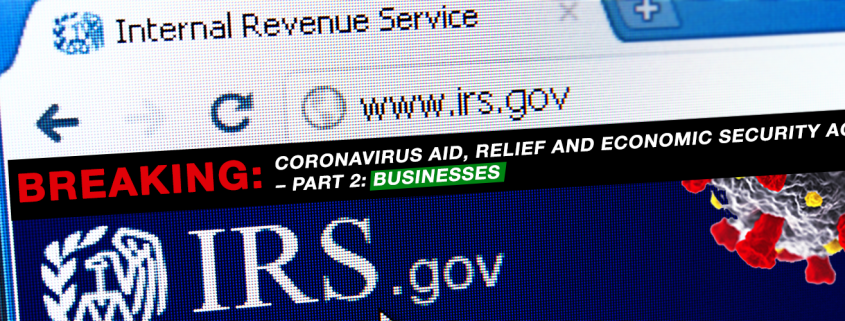Coronavirus Aid, Relief and Economic Security Act – Part 2: Businesses
Coronavirus Aid, Relief and Economic Security Act – Part 2: Businesses
On March 27, 2020 President Trump signed the $2 trillion Stimulus Bill formally known as the Coronavirus Aid, Relief and Economic Security [CARES] Act (the “CARES Act”) to provide assistance to workplaces and employees. The CARES Act provides many benefits intended to deliver cash into the hands of individuals and businesses, as well as many other tax provisions.
In this blog we will highlight the major provisions applying to businesses. Click here for our blog on provisions for individuals.
Employee Retention Credit
Eligible employers are allowed a credit against employment taxes for each calendar quarter equal to 50% of qualified wage (including health benefits) paid to employees. This amount is limited to $10,000 of wages paid to an employee for all calendar quarters.
An eligible employer is one which is in a trade or business:
- Whose operation is fully or partially suspended due to orders from an appropriate governmental authority limiting commerce, travel or group meetings due to COVID-19; or
- Who has a “significant decline” in gross receipts (i.e., there is a decrease to less than 50% of the gross receipts for the same quarter in the prior year).
Different rules apply as to the covered wages depending upon the number of employees the employer had in 2019. Tax exempt entities are also able to take advantage of this credit. However, this credit is not available to employers receiving a Small Business Interruption Loan under section 1102 of the Act or if a Work Opportunity Tax Credit is allowed for the employee. Additionally, this credit may not be available for state-licensed cannabis businesses as cannabis is a Class I controlled substance under Federal law.
Payroll Tax Holiday
There is a deferral of the employer’s share of payroll taxes for the period beginning on March 27, 2020 to January 1, 2021 pursuant to an SBA loan 7A or under Act section 1109.
Business Interest Expense Limit Increased
The TCJA generally provided that net business interest is deductible only to the extent of 30% of Adjusted Taxable Income. The CARES Act increases this limit to 50% for 2019 and 2020. Additionally, since the current economic problems cause by COVID-19 are expected to produce lower income in 2020 than in 2019, the CARES Act provides that a taxpayer can elect to use the 2019 Adjusted Taxable Income in place of 2020.
Incentive For 2020 Charitable Contributions
Be aware of new provisions encouraging charitable contributions:
- The limit on deductible charitable contributions by a C corporation (normally 10% of Taxable Income) is increased to 25%.
- Additionally, for a business making a contribution of food inventory, the limitation is increased from 15% to 25%.
The following provisions have retroactive effect that business may be able to claim refunds of previously paid taxes by filing amended tax returns for 2018:
Suspension Of Restrictions On The Use Of Net Operating Losses
Under the 2017 Tax Cuts And Jobs Act (TCJA), net operating losses were no longer eligible to be carried back, and their usage, when carried forward, was limited to 80% of taxable income. Under the CARES Act, net operating losses created in the 2018, 2019 and 2020 tax years can be carried back five years with no limitation on their usage.
Suspension Of Prior Business Loss Limitations
Under the TCJA, taxpayers (other than C corporations) were limited in utilizing net business losses (i.e., business losses in excess of business income). These taxpayers were limited to using only $250,000 ($500,000 on a married joint return) of net business losses against non-business income. The CARES Act suspends this rule so that net business losses for 2018, 2019 and 2020 can be used without limit.
Immediate Refund Of Corporate AMT Credit
The TCJA provided that the alternative minimum tax no longer applied to C corporations. Those corporations with AMT credits were given the ability to recover these amounts as tax reductions and refunds over a four-year period (2018 to 2021.) The CARES Act cuts this refund period in half (2018 to 2019) and corporations can make an election to recover the AMT credit entirely in 2018.
Reformation Of Bonus Depreciation for Qualified Improvement Property (QIP)
The CARES Act cures a legislative error under the TCJA and provides that the costs for Qualified Improvement Property are eligible for bonus depreciation. This provision is retroactive for 2018 QIP costs.
Click here for COVID-19 Tax Relief measures instituted by the IRS in “The IRS People First Initiative” that can benefit you.
What Should You Do?
You know that at the Law Offices Of Jeffrey B. Kahn, P.C. we are always thinking of ways that our clients can save on taxes and with these tax law changes it is possible that business can claim refunds now by filing an amended return. If you are selected for an audit, stand up to the IRS by getting representation. Tax problems are usually a serious matter and must be handled appropriately so it’s important to that you’ve hired the best lawyer for your particular situation. The tax attorneys at the Law Offices Of Jeffrey B. Kahn, P.C. located in Orange County (Irvine), Los Angeles (including Long Beach and Ontario) and elsewhere in California are highly skilled in handling tax matters and can effectively represent at all levels with the IRS and State Tax Agencies including criminal tax investigations and attempted prosecutions, undisclosed foreign bank accounts and other foreign assets, and unreported foreign income. Also if you are involved in cannabis, check out what a cannabis tax attorney can do for you. And if you are involved in crypto currency, check out what a bitcoin tax attorney can do for you.


 Follow
Follow Follow
Follow
